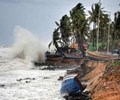
Global warming has led to a lot of things, extinction of species, destruction of coral reefs and now we even have to face frequent storms throughout the world. While Cyclone Jawad recently wreaked havoc in Southern India, Storm Barra has left people in Wales, UK and Ireland without electricity.
30,000 houses in Ireland and 500 residences in Scotland were left without electricity due to the fierce Storm Bara which swept in from the Atlantic ocean recently. These new disruptions occurred only days after Britain's final households were reconnected following Storm Arwen, which caused "catastrophic damage" to energy networks, mostly in north-east Scotland, impacting 135,000 homes.
On Wednesday morning, over 1,000 houses in Scotland lost power due to flood warnings in 11 districts. The occurrences of these storms and cyclones have increased a lot in the past few years. According to the climate monitoring reports from the National Centers For Environmental Information the year 2014 only had 8 tropical storms, however, this number rose to 17 in 2018 and 18 in 2019.
In 2020 the world saw the occurrence of 103 storms and in 2021 this number has stabilized back to 21.
This is a major concern for the world as a whole. According to another report released by the Intergovernmental Panel on Climate Change Sixth Assessment Report, on 2021:
-
Due to global warming and related increases in atmospheric moisture content, tropical cyclone rainfall rates are expected to rise in the future (medium to high confidence). For a 2 degree Celsius global warming scenario, modeling studies predict a 10-15 percent rise in rainfall rates averaged within around 100 kilometres of the storm.
-
On average, tropical storm intensities are expected to grow (medium to high confidence) (by 1 to 10 per cent according to model projections for a 2 degree Celsius global warming). Assuming no drop in storm magnitude, this adjustment would result in an even higher percentage rise in the destructive potential per storm. The impact of anthropogenic warming on storm magnitude is unknown.
This is a clear signal of how much effort we need to put in to stop global warming to help decrease the number of storms like Arwen and Barra that occur on an annual basis.
















